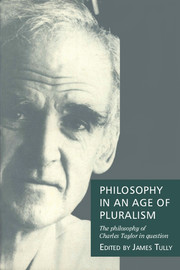Book contents
- Frontmatter
- Contents
- Notes on the contributors
- Preface
- Acknowledgements
- Introduction
- Part I Foundations
- Part II Interpreting modernity
- 3 Modernity and disenchantment: some historical reflections
- 4 Religion, history and moral discourse
- 5 The risks and responsibilities of affirming ordinary life
- Part III Natural and human sciences
- Part IV Philosophy in practice
- Part V Ethics, politics and pluralism
- Part VI Reply and re-articulation
- Bibliography of the works of Charles Taylor
- Index
5 - The risks and responsibilities of affirming ordinary life
Published online by Cambridge University Press: 05 June 2012
- Frontmatter
- Contents
- Notes on the contributors
- Preface
- Acknowledgements
- Introduction
- Part I Foundations
- Part II Interpreting modernity
- 3 Modernity and disenchantment: some historical reflections
- 4 Religion, history and moral discourse
- 5 The risks and responsibilities of affirming ordinary life
- Part III Natural and human sciences
- Part IV Philosophy in practice
- Part V Ethics, politics and pluralism
- Part VI Reply and re-articulation
- Bibliography of the works of Charles Taylor
- Index
Summary
‘[w]e are born only once on this earth, and only one and no other historic time is given to us.’
Czeslaw MiloszWhat does it mean for a political philosopher to affirm ordinary life? Indeed, what does an affirmation of this sort, urged on us by Charles Taylor, imply as to the subject matter of political philosophy and its identity in relation to the world of modern state-centred politics? I have selected this theme for a closer examination in part because I have called for something similar – ‘the redemption of everyday life’ – and it has never been crystal clear to me what the full implications of such a summons might be were one required to work them out. I agree with Taylor that ‘this affirmation of ordinary life … has become one of the most powerful ideas in modern civilization’, but I also believe that this affirmation is an increasingly troubled one, harder and harder to sustain, not so much against its ‘knockers’ as against its ostensible supporters or ‘boosters’.
What are we enjoined to affirm when we locate ‘ordinary life’ above the heroic, history making (in the grand sense) virtues or imperatives? Taylor is surely right to suggest that the ground for controversy now is the manner of living that ordinary life which we would affirm.
- Type
- Chapter
- Information
- Philosophy in an Age of PluralismThe Philosophy of Charles Taylor in Question, pp. 67 - 80Publisher: Cambridge University PressPrint publication year: 1994



